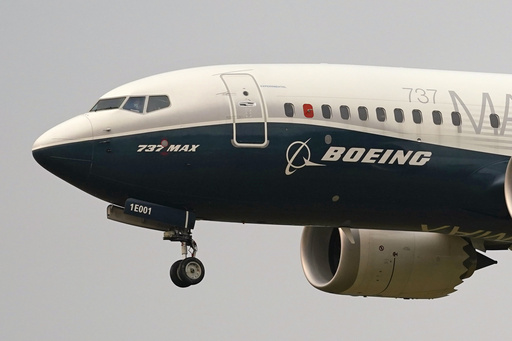The Justice Department submitted an agreement with Boeing on Wednesday in which the aerospace giant will plead guilty to a fraud charge for misleading U.S. regulators who approved the 737 Max jetliner before two of the planes crashed, killing 346 people.
The detailed plea agreement was filed in federal district court in Texas. The American company and the Justice Department reached a deal on the guilty plea and the agreement’s broad terms earlier this month.
The final version states Boeing admitted that through its employees, it made an agreement “by dishonest means” to defraud a Federal Aviation Administration group that evaluated the 737 Max. Because of Boeing’s deception, the FAA had “incomplete and inaccurate information” about the plane’s flight-control software and how much training pilots would need for it, the plea agreement says.
U.S. District Judge Reed O’Connor can accept the agreement and the sentence worked out between Boeing and prosecutors, or he could reject it, which likely would lead to new negotiations between the company and the Justice Department.
The deal calls for the appointment of an independent compliance monitor, three years of probation and a fine of at least $243.6 million. It also requires Boeing to invest at least $455 million “in its compliance, quality, and safety programs.”
Boeing issued a statement saying the company “will continue to work transparently with our regulators as we take significant actions across Boeing to further strengthen” those programs.
Paul Cassell, a lawyer for families of victims of the 737 Max crashes who wanted Boeing to face trial, criticized the agreement.
“The plea has all the problems in it that the families feared it would have. We will file a strong objection to the preferential and sweetheart treatment Boeing is receiving,” he said.
Boeing was accused of misleading the FAA about aspects of the Max before the agency certified the plane for flight. Boeing did not tell airlines and pilots about the new software system, called MCAS, that could turn the plane’s nose down without input from pilots if a sensor detected that the plane might go into an aerodynamic stall.
Max planes crashed in 2018 in Indonesia and 2019 in Ethiopia after a faulty reading from the sensor pushed the nose down and pilots were unable to regain control. After the second crash, Max jets were grounded worldwide until the company redesigned MCAS to make it less powerful and to use signals from two sensors, not just one.
Boeing avoided prosecution in 2021 by reaching a $2.5 billion settlement with the Justice Department that included a previous $243.6 million fine. It appeared that the fraud charge would be permanently dismissed until January, when a panel covering an unused exit blew off a 737 Max during an Alaska Airlines flight. That led to new scrutiny of the company’s safety.
In May of this year, prosecutors said Boeing violated terms of the 2021 agreement by failing to make promised changes to detect and prevent violations of federal anti-fraud laws. Boeing agreed this month to plead guilty to the felony fraud charge instead of enduring a potentially lengthy public trial.
The role and authority of the monitor is viewed as a key provision of the new plea deal, according to experts in corporate governance and white-collar crime. Cassell has said that families of the crash victims should have the right to propose a monitor for the judge to appoint. The agreement calls for the government to select the monitor “with feedback from Boeing.”
In Wednesday’s filing, the Justice Department said that Boeing “took considerable steps” to improve its anti-fraud compliance program since 2021, but the changes “have not been fully implemented or tested to demonstrate that they would prevent and detect similar misconduct in the future.”
That’s where the independent monitor will come in, “to reduce the risk of misconduct,” the plea deal states.
Boeing, which is based in Arlington, Virginia, is a major Pentagon and NASA contractor, and a guilty plea is not expected to change that. Government agencies have leeway to hire companies even after a criminal conviction. The plea agreement does not address the topic.
Some of the passengers’ relatives plan to ask the judge to reject the plea deal. They want a full trial, a harsher penalty for Boeing, and many of them want current and former Boeing executives to be charged.
If the judge approves the deal, it would apply to the criminal charge stemming from the 737 Max crashes. It would not resolve other matters, potentially including litigation related to the Alaska Airlines blowout.
Boeing could appeal any order the court imposes to pay restitution to victims’ families — the agreement leaves restitution up to the judge. The company could also appeal if the judge indirectly increases the fine beyond $243.6 million by failing to give Boeing credit for an identical amount it paid as part of the 2021 settlement.
O’Connor will give lawyers for the families seven days to file legal motions opposing the plea deal. Boeing and the Justice Department will have 14 days to respond, and the families will get five days to reply to the filings by the company and the government.
Source: post





